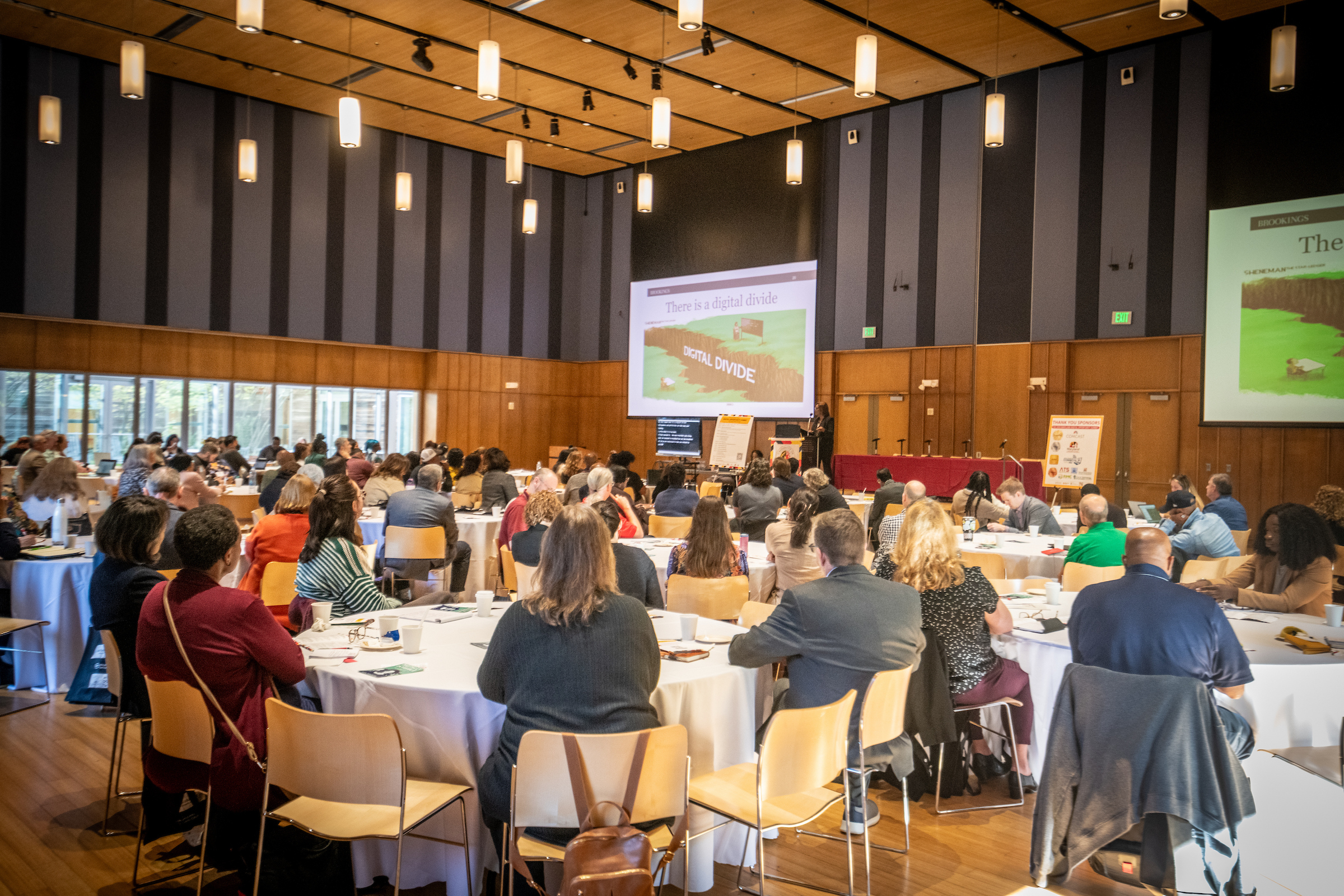SILVER SPRING, MD – Nearly 170 Maryland state leaders, policymakers, and advocates gathered on October 15 at the Silver Spring Civic Building for the 2025 Maryland Digital Opportunity Summit. Under the theme "Investing in Maryland's Future," attendees of this full-day conference examined how strategic digital investments can fuel workforce innovation and economic development.
Summit Takeaways
The 2025 Maryland Digital Opportunity Summit revealed collaboration and resilience as defining characteristics of Maryland's approach to digital opportunities. Despite an uncertain funding and political landscape, the state's communities, businesses, and organizations are delivering measurable results—building careers and strengthening local economies by expanding device access, strengthening broadband infrastructure, and advancing digital skill competencies.
Since 2023, 110,000 Maryland households have gained broadband access, statewide connectivity has reached 99.5%, and adoption rates are at 65%. In addition, 140,000 digital devices have been distributed, 135,000 residents trained in digital skills, and 2,200 jobs and apprenticeships created.
These achievements represent more than statistics—they signal a fundamental shift in how Marylanders access education, healthcare, employment, and civic engagement. Broadband is no longer a luxury but a lifeline, enabling students to complete homework, workers to access remote opportunities, seniors to connect with telehealth services, and small businesses to compete in the digital economy.
A defining message of the 2025 summit is the imperative of sustainability and resilience. As funding of federal programs changes, Maryland's multi-sector partnerships—spanning government, private industry, nonprofits, and educational institutions—provide a durable framework for continued progress. The state of Maryland has demonstrated that digital inclusion doesn't depend on a single funding stream or political cycle, but on sustained, collaborative commitment to ensuring every Marylander can participate fully in an increasingly digital world.
Summit Sessions Recap
Dr. Jinhee Kim, Professor and Associate Dean at University of Maryland Extension (UME), delivered the summit’s opening remarks, welcoming attendees and sharing the measurable impact that Marylanders Online has had in promoting digital access and skills across the state. To date, UME’s Digital Literacy Project has reached 56,000 Marylanders through digital skills programming, facilitated 5,400 Affordable Connectivity Program (ACP) enrollments, supported 1,300 community events, and trained over 400 digital navigators. The Marylanders Online Tech Support Helpline has fielded 26,000 calls, while the Maryland Digital Equity Coalition (MDEC), led by Marylanders Online, has expanded to nearly 370 partners representing every jurisdiction across the state.
Ronnie Hammond, Director of the Maryland Office of Statewide Broadband, expanded on Dr. Kim’s remarks by providing a comprehensive overview of the state’s digital progress, highlighting successes in broadband expansion, digital inclusion, and cross-sector partnerships among ISPs, businesses, educators, nonprofits, and communities.
The 2025 summit keynote was delivered by Dr. Nicol Turner Lee, Senior Fellow at Brookings Institution, Director of the Center for Technology Innovation, and Founder of the AI Equity Lab, and author of Digitally Invisible. Her address emphasized the need to overcome structural and behavioral barriers to digital access, highlighted digital disconnection as a critical social determinant of health, and underscored that digital literacy remains essential in the age of AI.
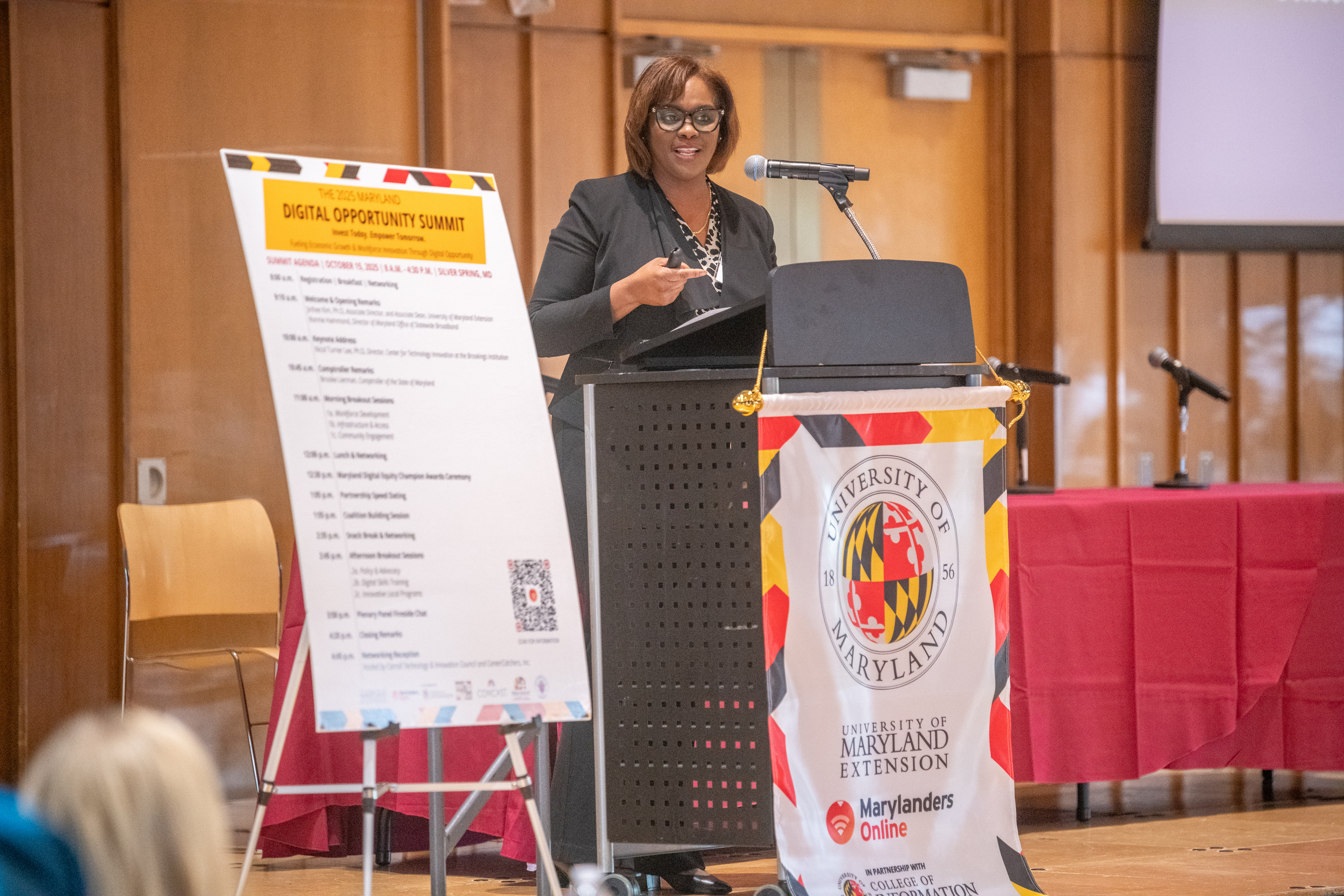
Pictured: Nicol Turner Lee, Ph.D, delivers the 2025 Summit’s keynote address. Photo credits: Edwin Remsberg
Following the keynote, Brooke Lierman, Comptroller of Maryland, discussed the state’s modernization of IT infrastructure, restructuring of staff, and increased focus on community engagement. As a state delegate, Lierman sponsored House Bill 97, the Digital Connectivity Act of 2021, which established the Office of Statewide Broadband within the Department of Housing and Community Development (DHCD). The legislation created a framework to address the digital divide, making Maryland one of the first states to tackle both broadband infrastructure and digital equity at a statewide level.
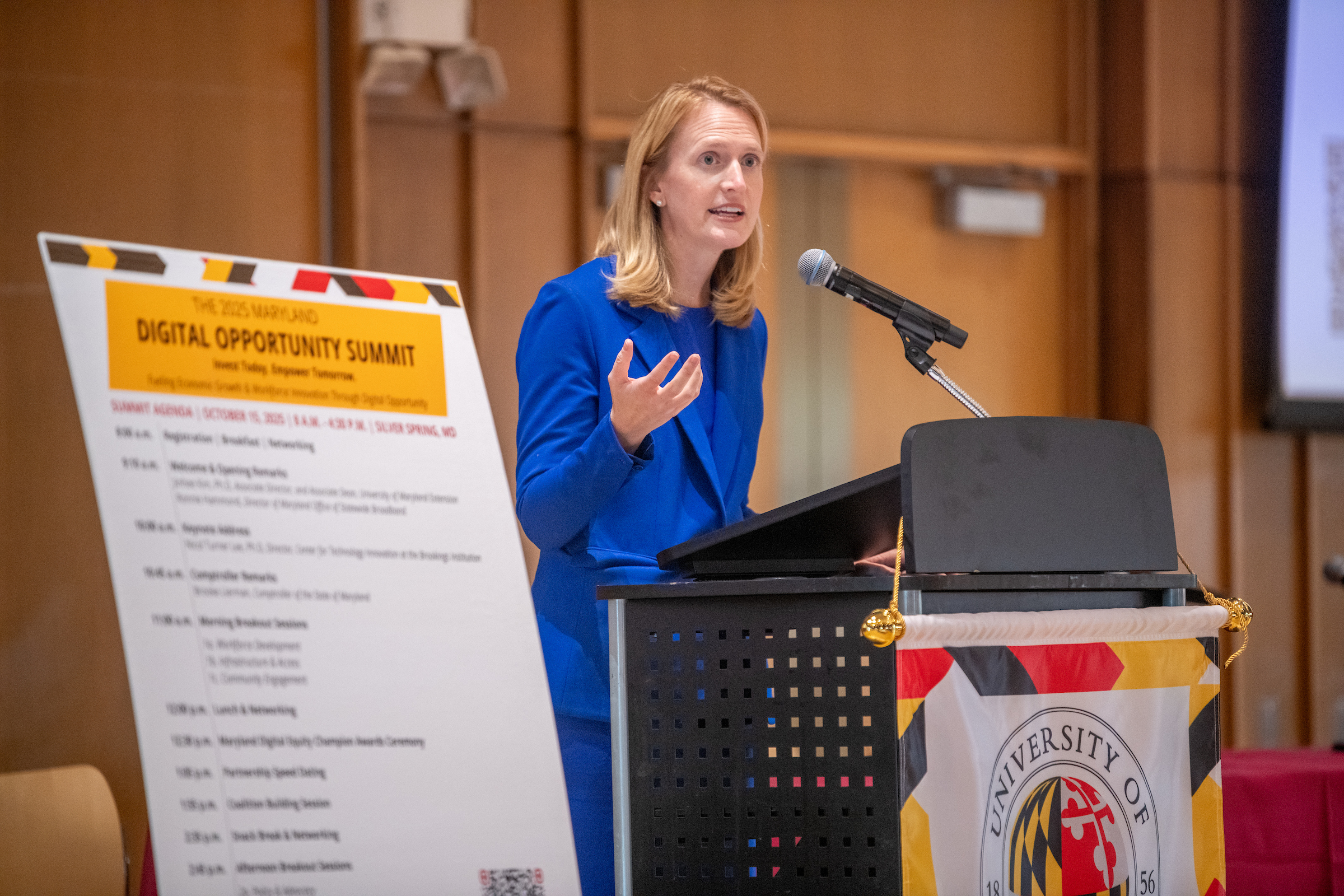
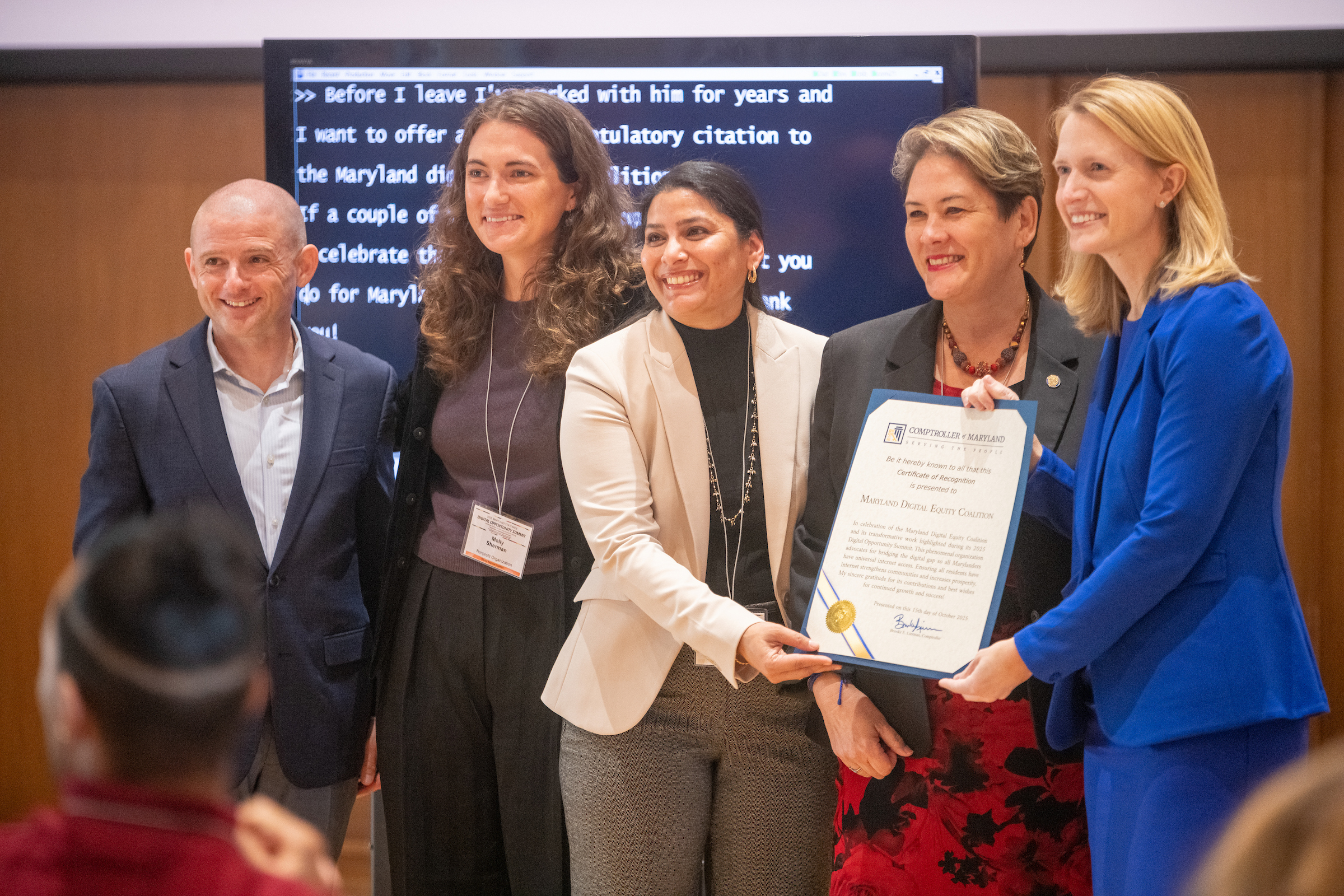
Picture 1: Comptroller Lierman delivers her opening remarks about Maryland’s Digital Roadmap. Picture 2: Josh Bokee, Molly Sherman, Vishnupriya Desai, Mistuko Herrera, and Brooke Lierman stand with a Digital Opportunity Citation.
The Workforce Development Breakout Panel explored how digital skills drive vocational and economic growth, taking into consideration evolving workforce needs and their implications for job seekers and policymakers. Panelists highlighted the connection between digital literacy and career advancement, shared successful training models, and discussed strategies for building partnerships among employers, educators, and community organizations to strengthen the state’s digital workforce ecosystem.
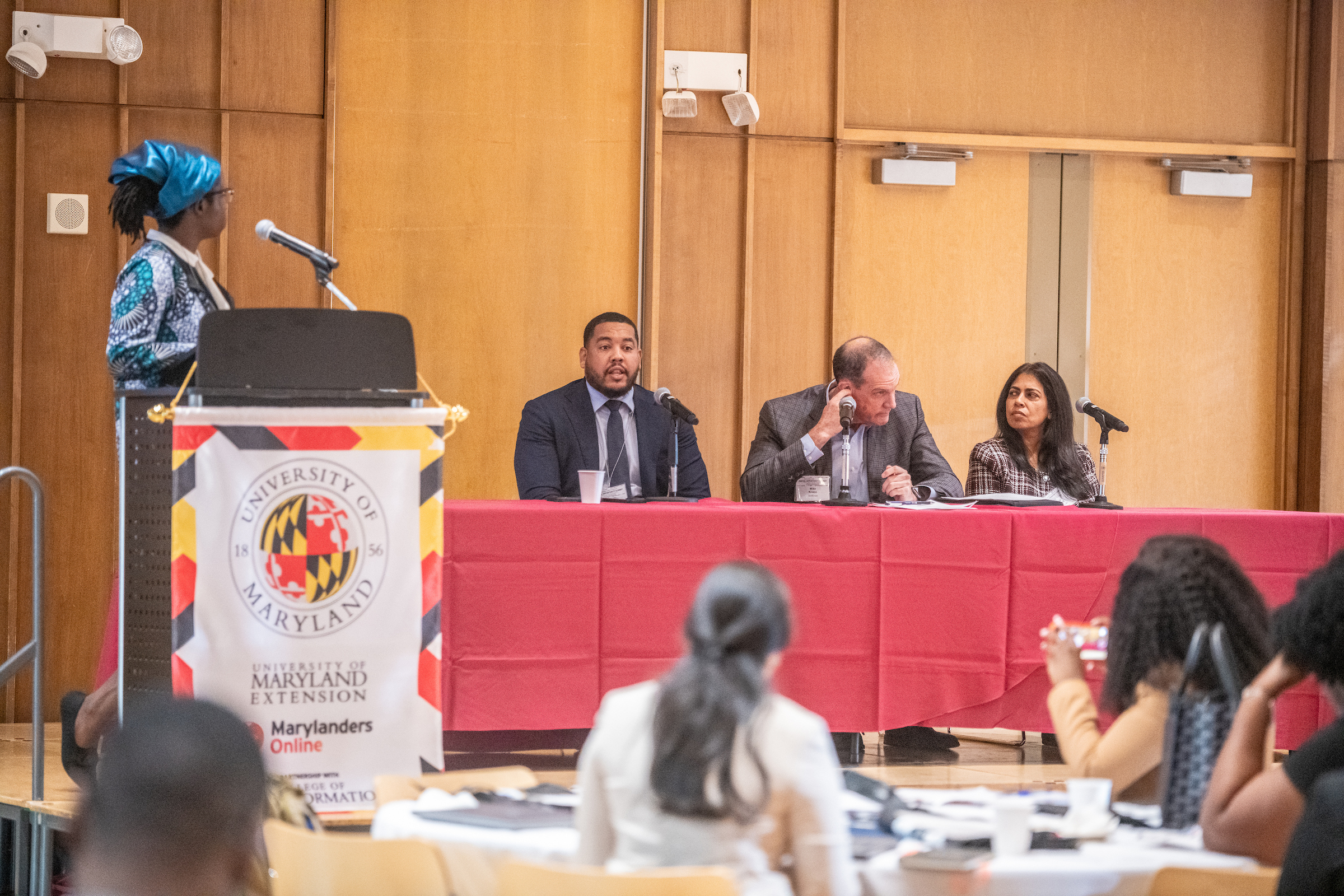
Pictured: Workforce Development Breakout Panel, left to right: Marokey Sawo, Research Associate, Research to Action Lab, Center for Equity and Community Impact - Urban Institute; Devin Jackson, Chief Executive Officer, A Prosperous Tomorrow; Mike Knapp, Chief Executive Officer, SkillSmart; Suja Joseph, Director of Reemployment Programs, Maryland Department of Labor
________________
The Infrastructure & Access Breakout Panel examined Maryland’s broadband landscape, highlighting both the state’s progress and the remaining gaps in connectivity, service, affordability, and policy. Panelists discussed the policy frameworks and stakeholder collaborations shaping broadband deployment and explored strategies to better align infrastructure expansion with affordability initiatives and digital adoption efforts to ensure access for all Marylanders.
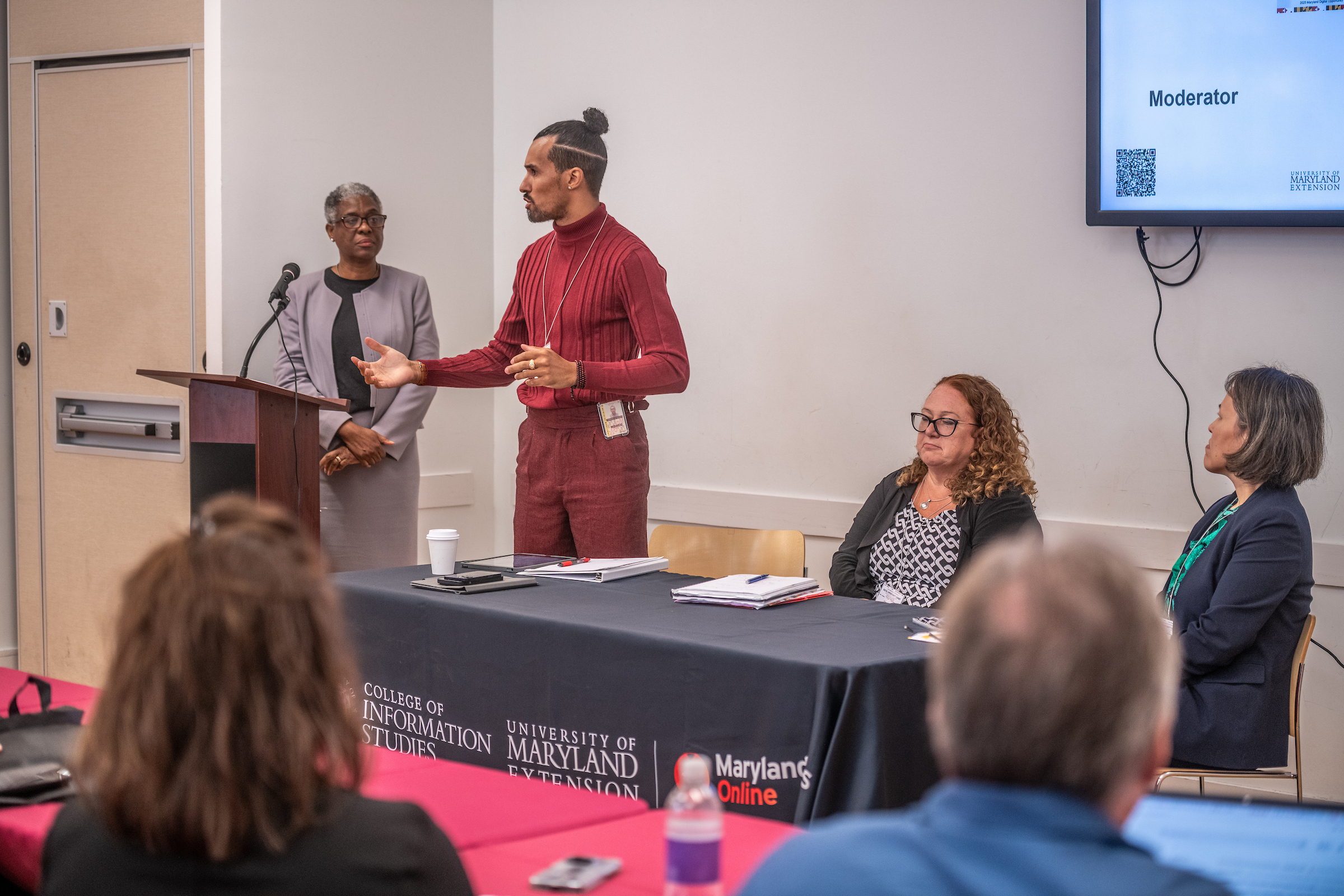
Pictured: Infrastructure & Access Breakout Panel, left to right: Claudia Wilson Randall, Executive Director, Community Development Network of Maryland; Ronnie Hammond, Director, Maryland Office of Statewide Broadband; Charlotte Davis, Executive Director, Rural Maryland Council; Kaori Hirakawa, M.A., Chief Executive Officer, One Language, LLC
________________
The Community Engagement Breakout Panel explored innovative and data-driven strategies for supporting sustainable, community-led digital inclusion programs. Panelists shared best practices for engaging with people of all ages, skill levels, and backgrounds, emphasizing the vital role of grassroots leadership and community-directed advocacy in successful community-based outreach and programming.
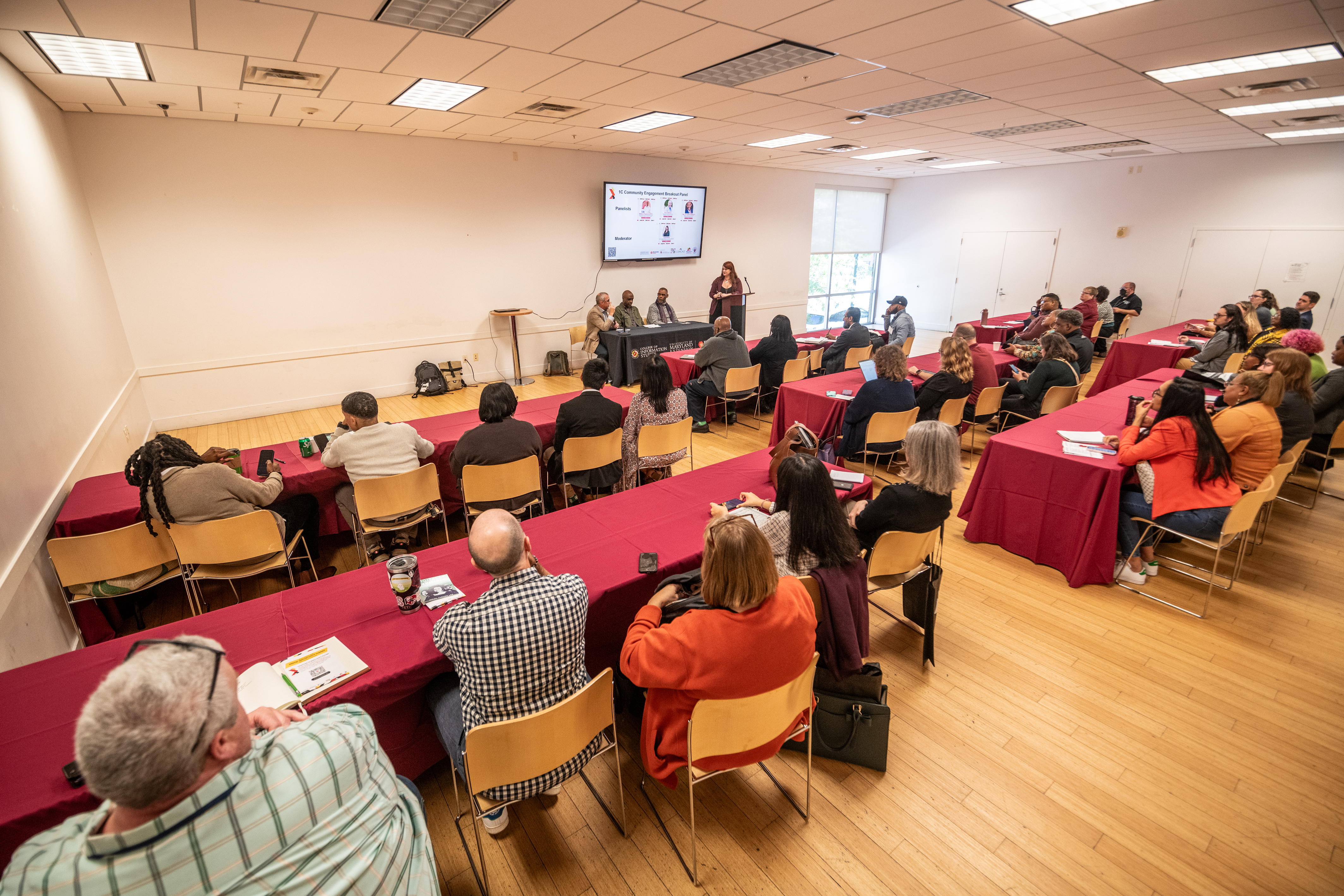
Pictured: Community Engagement Breakout Panel, left to right: Ken Oldham, Chief Executive Officer, United Way of Frederick County; William Hegwood, M.S., Lead Career Coach, Rapid Rehousing Vocational Program, The CareerCatchers, Inc.; Reverend Dr. Alfred Bailey II, Minister of Mission and Outreach, New Psalmist Baptist Church; Julie Slivka, Communications Manager, University of Maryland Extension Digital Literacy Project
________________
The Policy & Advocacy Breakout Panel focused on how strategic engagement at the state and federal levels drives legislation, funding, and program implementation to expand digital opportunity. Panelists examined key policy issues and shared effective advocacy strategies for building coalitions and engaging decision-makers to advance lasting, systemic change.

Pictured: Policy & Advocacy Breakout Panel, left to right: Delegate Kris Fair, Maryland House of Delegates, District 3; Shae Gardner, Director of Policy & Research, LGBT Tech; Tsion Tesfaye, Senior Research & Policy Manager, National Digital Inclusion Alliance; Dhanaraj Thakur, Ph.D., Research Director, Center for Democracy & Technology
________________
The Digital Skills Training Breakout Panel introduced effective, learner-centered approaches to building digital competency across communities. Panelists highlighted programs designed to be inclusive and responsive to local needs, while recommending key metrics and evaluation frameworks to measure the impact and success of digital skills initiatives.

Pictured: Digital Skills Training Breakout Panel, left to right: Aziz Hurtado Olson, Tech Extension Educator, University of Maryland Extension; Demetrius Goodwin, Chief Executive Officer, NPower; Ashley Lane, LMSW, C-PHM, Executive Director, Housing Authority of the City of Frostburg; Liz Gabbitas, MLIS, Founder & Managing Director, Libraries 4 Digital Equity
________________
The Innovative Local Programs Breakout Panel showcased creative and scalable digital inclusion initiatives occurring in Maryland and around the country. Panelists shared examples of replicable models and emphasized that existing successful programs can be adapted and tailored to meet the unique needs of different communities, rather than creating entirely new initiatives.

Pictured: Innovative Local Programs Breakout Panel, left to right: John Horrigan, Ph.D., Senior Fellow, Benton Institute for Broadband & Society; Vishnupriya Desai, Digital Equity Program Manager, Maryland Office of Statewide Broadband; Gretchen LeGrand, M.S., Senior Program Manager for Digital Equity, Robert W. Deutsch Foundation; Mac McComas, M.A., Senior Program Manager, Johns Hopkins 21st Century Cities Initiative.
Coalition Building & Partnership Speed Dating
Many summit attendees identified the Partnership Speed Dating & Coalition Building Sessions as among the most dynamic and engaging highlights of the event. Led by Molly Sherman of the Carroll County Technology & Innovation Council, the Partnership Speed Dating session offered a fast-paced, 40-minute networking opportunity for participants to connect with potential collaborators, align expertise and goals, and explore joint initiatives to strengthen Maryland’s local digital opportunity ecosystem.
Facilitated by the Office of Statewide Broadband, the Coalition Building session built on the Speed Dating connections, helping participants transform networking contacts into actionable regional coalitions. Participants separated into regional groups to exchange strategies for sustainable collaboration, develop shared goals, and lay the foundation for ongoing digital inclusion coalition efforts.
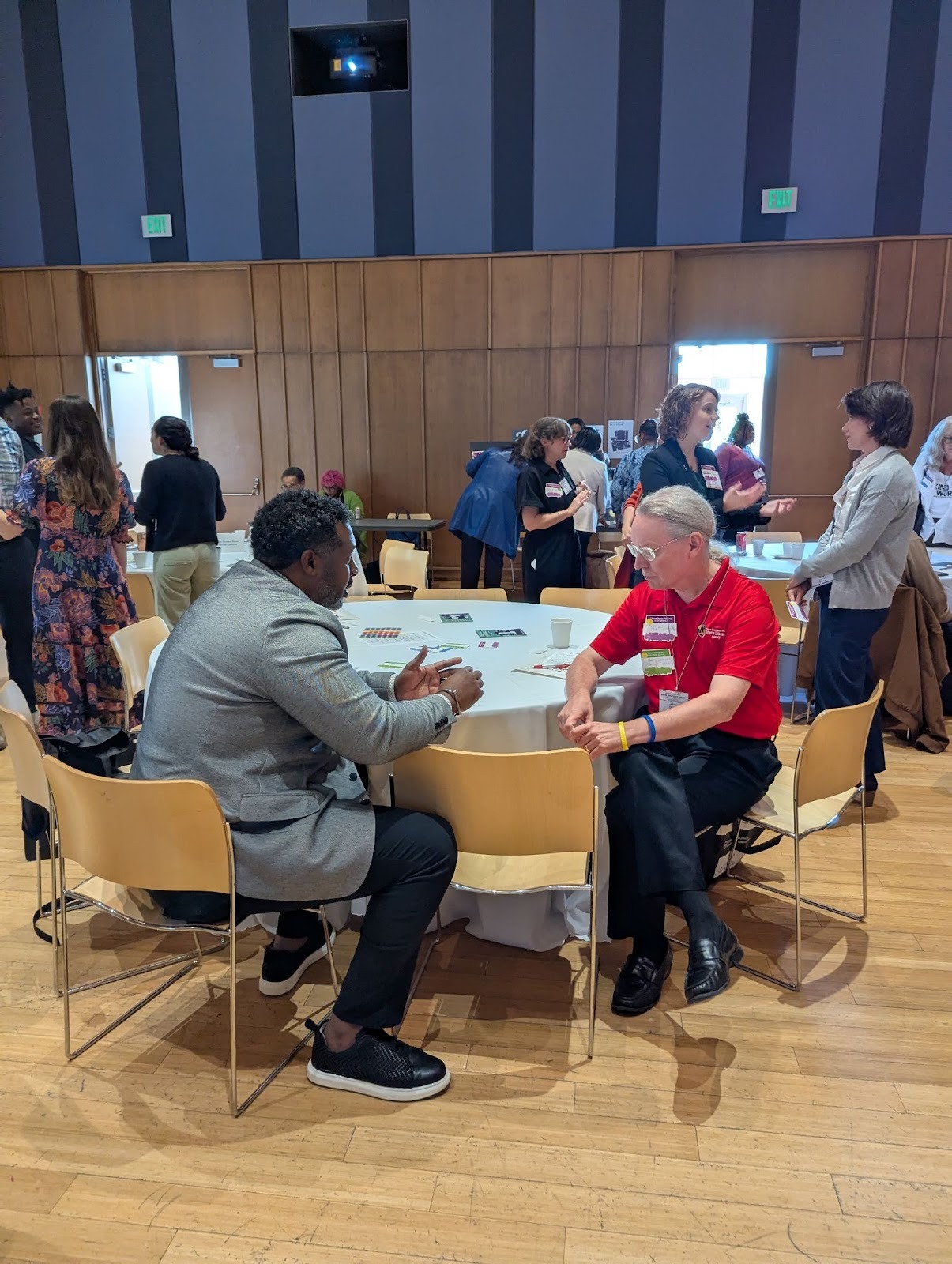


Pictured: Summit attendees connected with new partners and worked towards building sustainable regional coalition networks within the broader Maryland Digital Equity Coalition.
After lunch, the Maryland Digital Equity Awards Ceremony was held to honor outstanding champions and honorable mentions in four categories: Navigator, Practitioner, Program, and Workforce. Read more about the 2025 Maryland Digital Equity Champion awardees.
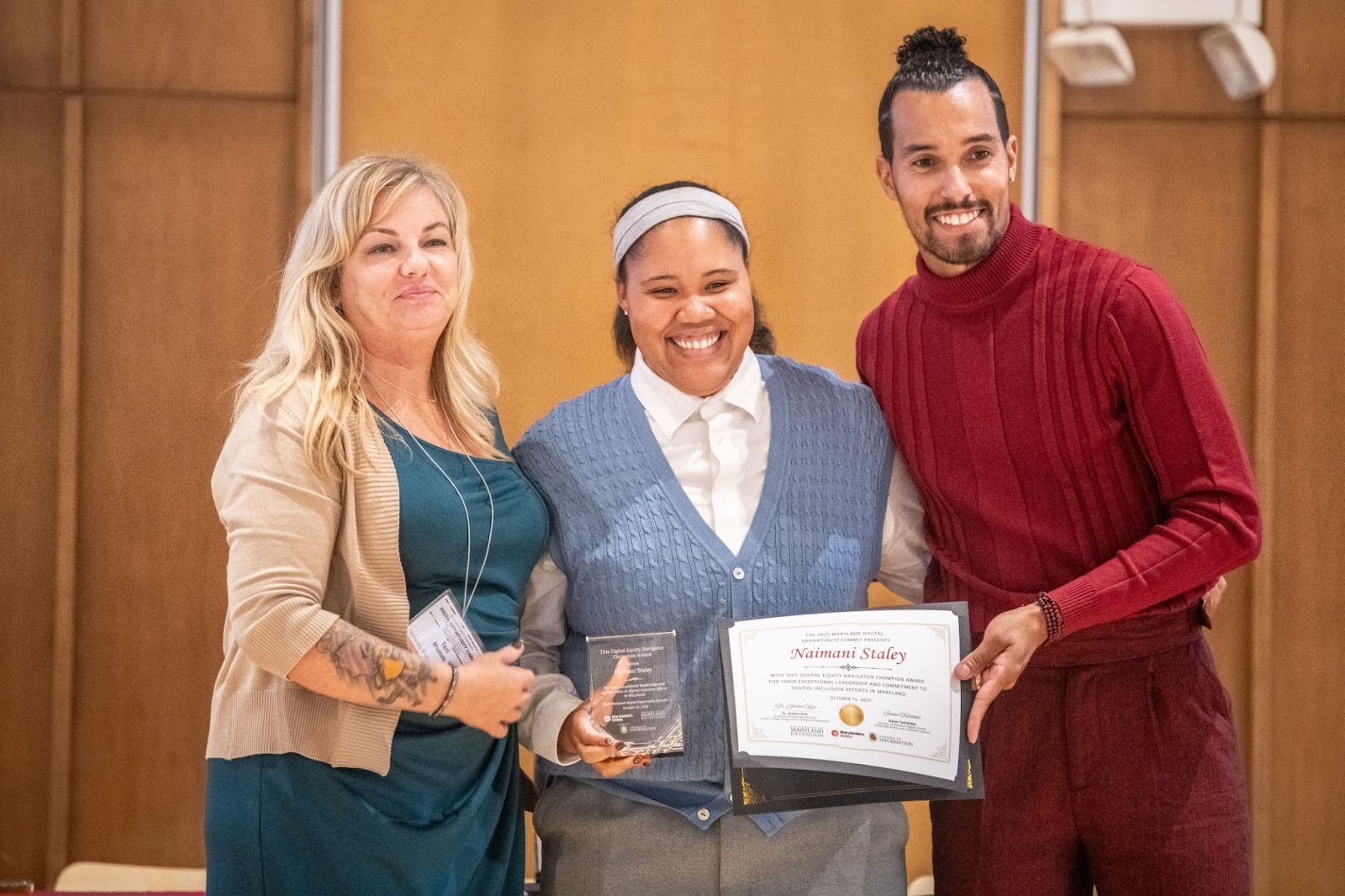
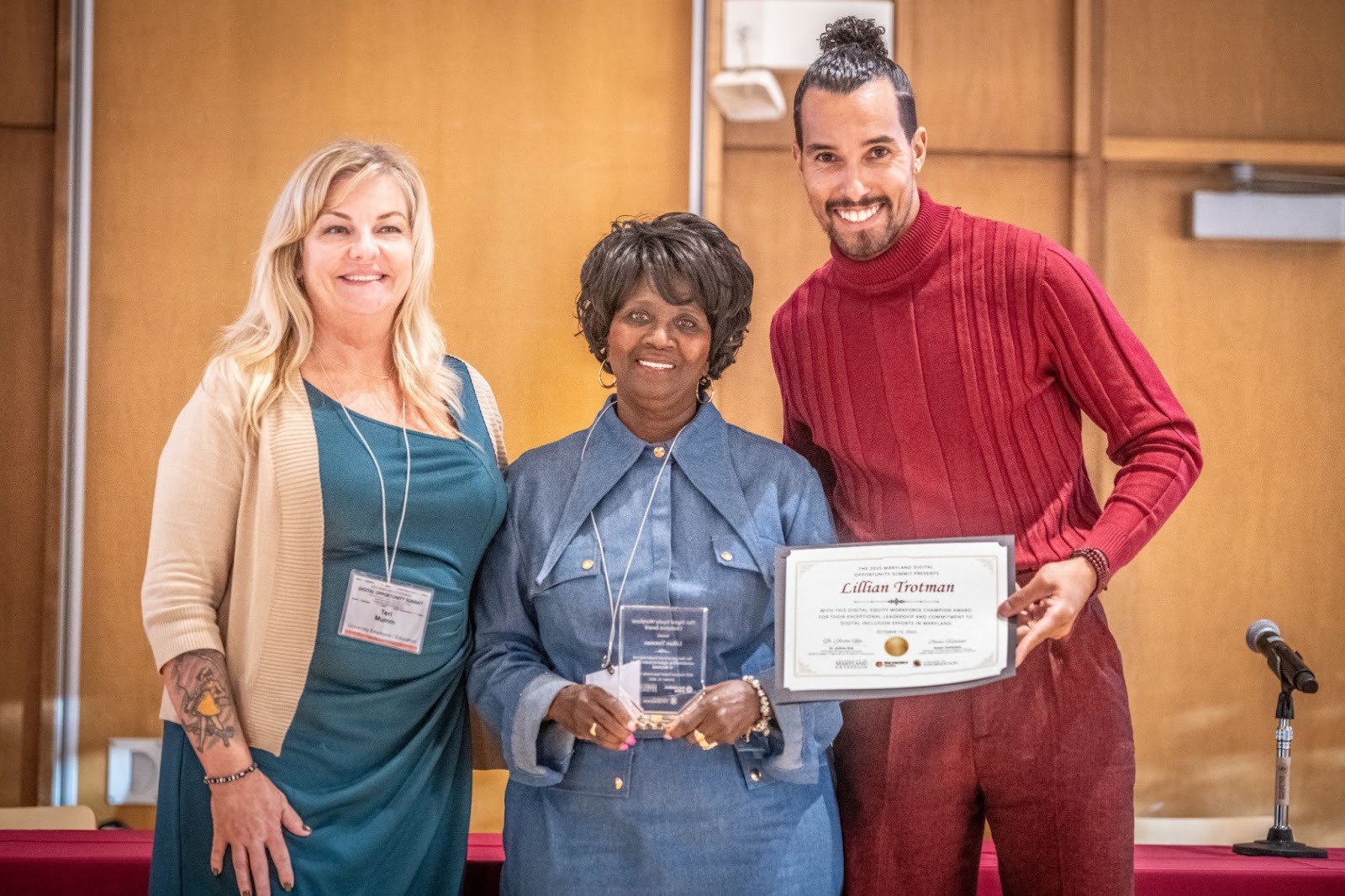
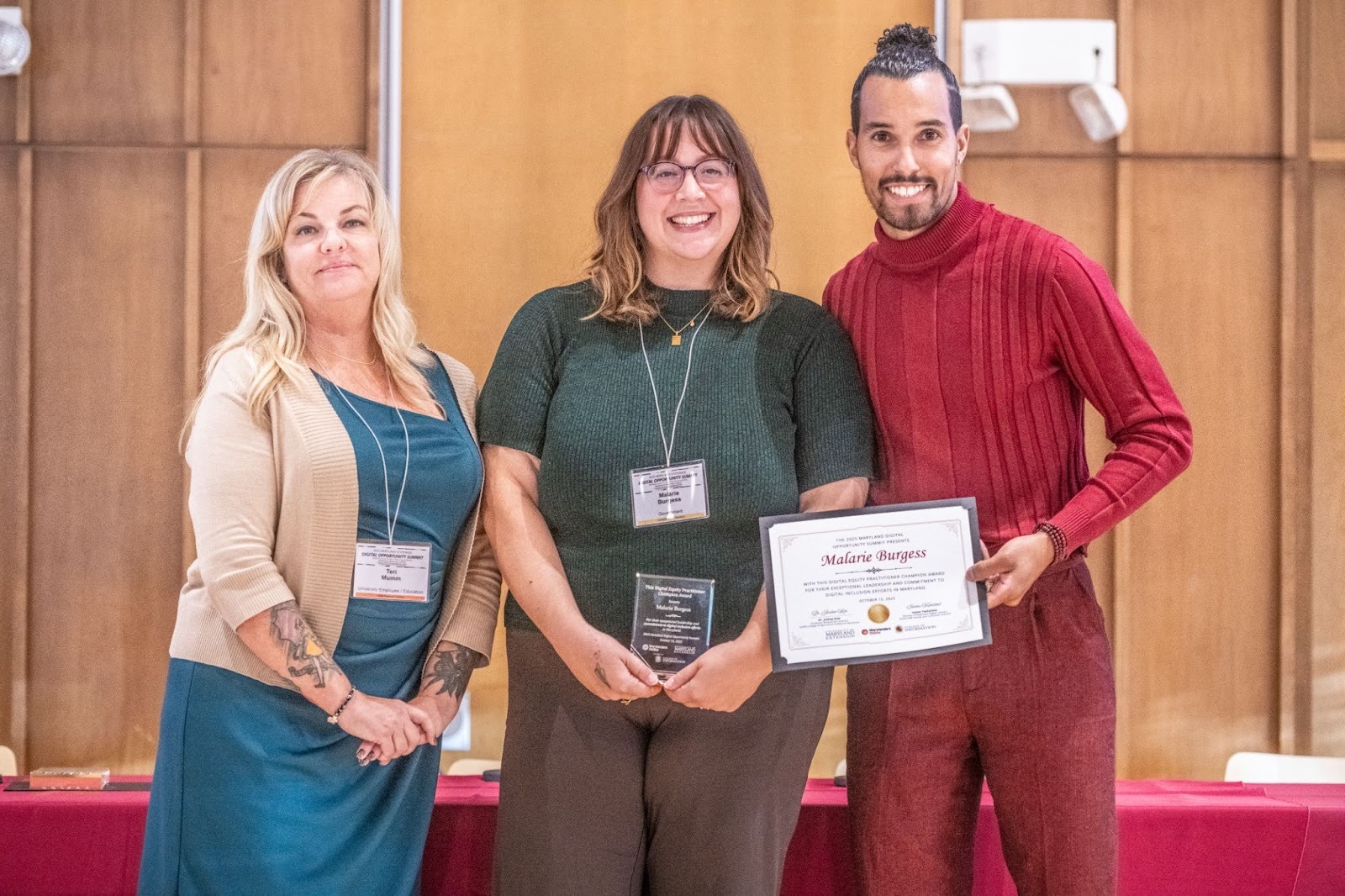
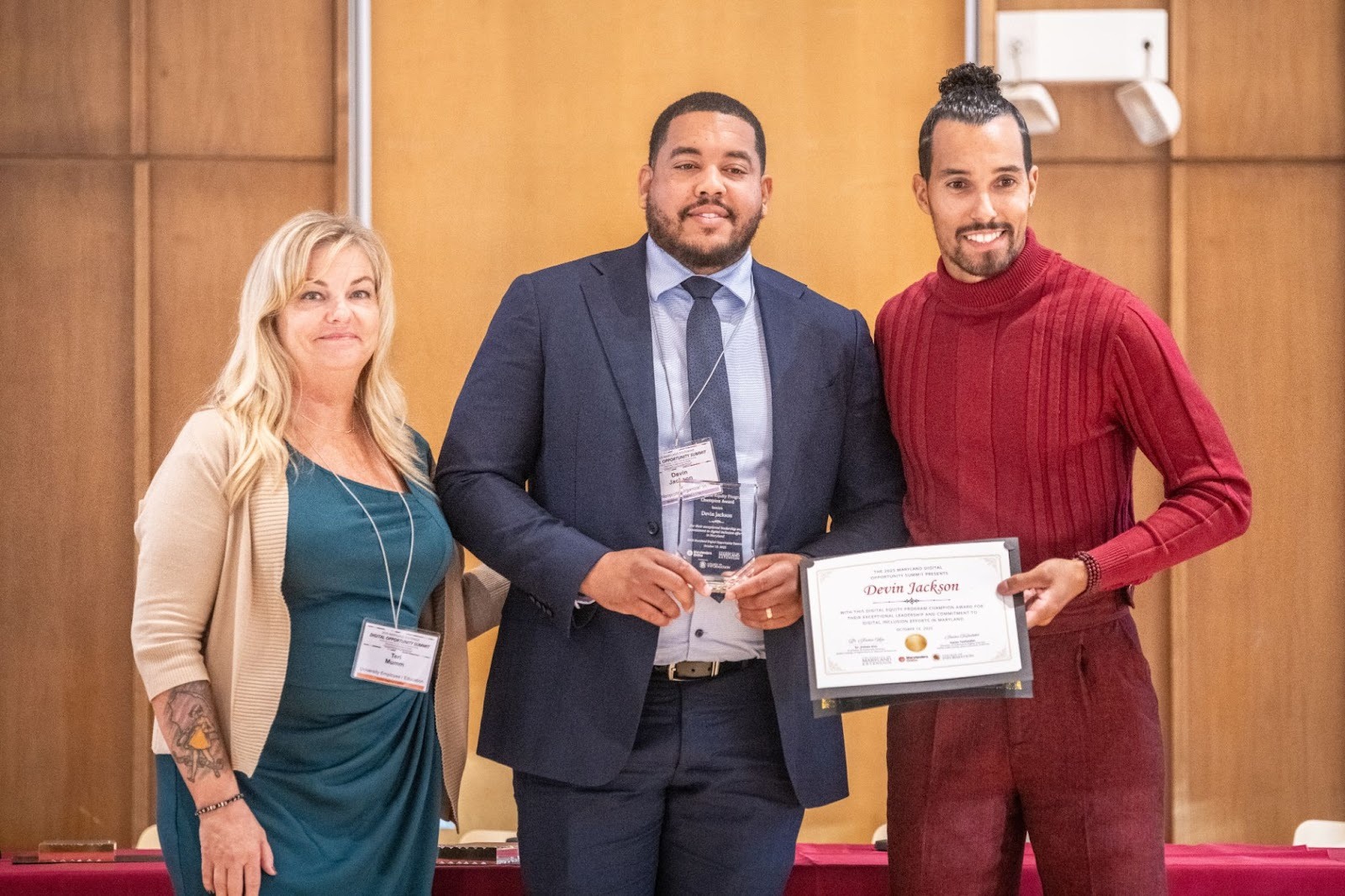
Pictured: Naimani Staley, Lillian “Lil” Trotman, Malarie Burgess, and Devin Jackson accept their respective Digital Equity Champion Awards.
At the Plenary Panel & Fireside Chat, panelists examined Maryland’s current challenges and policy landscape, highlighting strategies for sustainable funding and legislative actions needed to advance statewide digital inclusion. The session reinforced a shared commitment to expanding digital opportunity, stressing the critical need to protect and grow programs that build digital, civic, social, and economic opportunities in urban and rural communities alike.
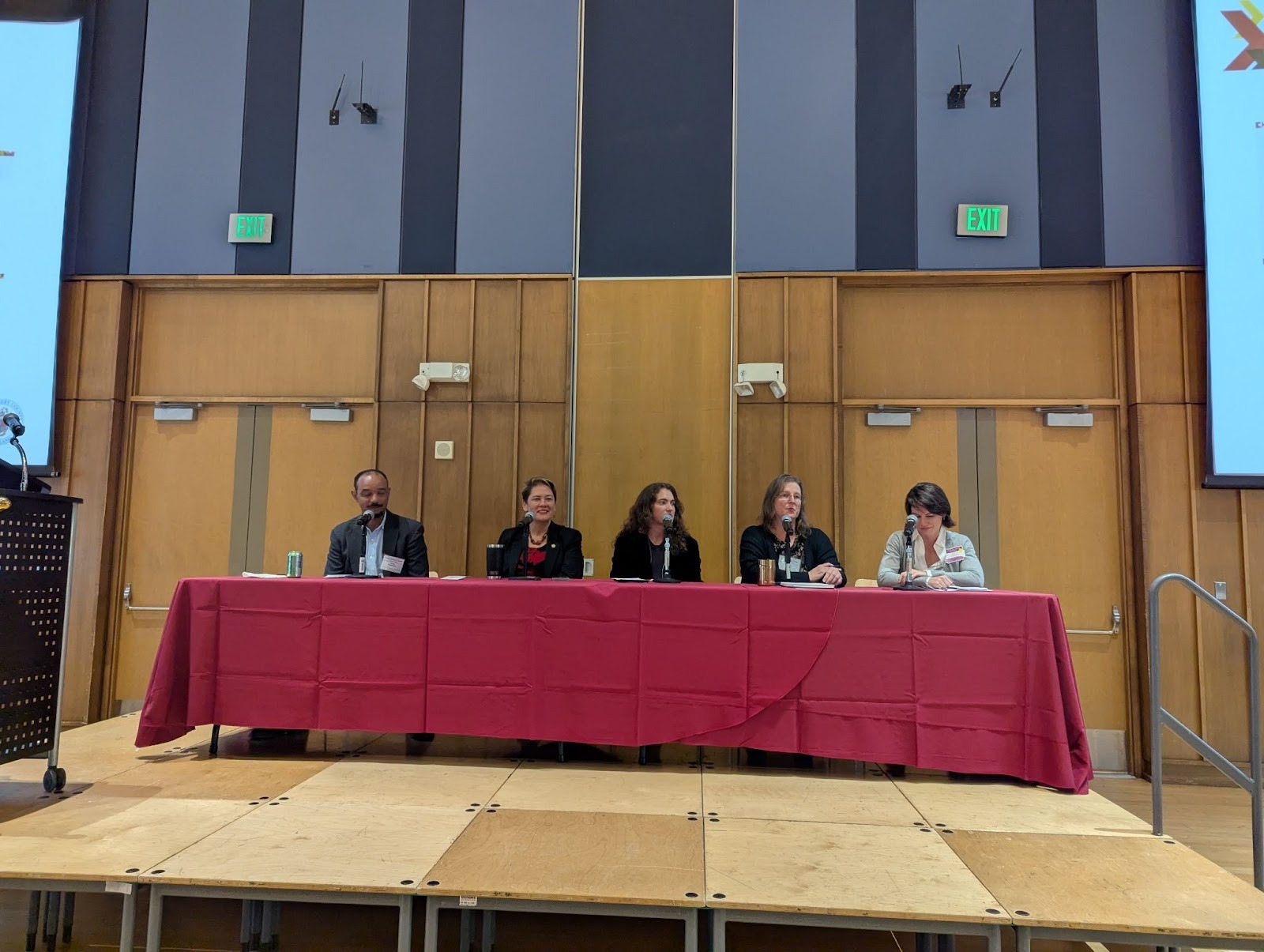
Pictured: Isaias Tesfalidet, Project Director, University of Maryland Extension Digital Literacy Project; Mitsuko Herrara, J.D., Program Director, Montgomery Connects; Molly Sherman, Executive Director, Carroll Technology & Innovation Council; Cheryl DeBerry, Broadband and Energy Manager, Garrett County Government; Whitney Moret, Deputy Director of Broadband & Digital Equity, Baltimore City Information Technology
Summit Sponsors
The 2025 summit is presented by the University of Maryland Extension’s Marylanders Online initiative, in partnership with the College of Information and the Maryland Digital Equity Coalition (MDEC). Comcast is the presenting sponsor, with the Maryland Department of Housing and Community Development as the platinum sponsor. Space for this event was provided by Community Use of Public Facilities (CUPF) and is sponsored by Montgomery County Government.
2025 summit attendees are eligible to receive 6 Health Education CECHs or 4 Category 1 Social Work CEUs. Attendees also had the option of enrolling in the Marylanders Online Navigation Educator Toolkit (MONET) Digital Navigator Training Certification program.
About The University of Maryland Extension
Marylanders Online is an initiative of the University of Maryland Extension (UME) and the College of Information (INFO), funded by the state, that aims to bridge the digital divide in Maryland. For additional resources and information, visit marylandersonline.umd.edu.
University programs, activities, and facilities are available to all without regard to race, color, sex, gender identity or expression, sexual orientation, marital status, age, national origin, political affiliation, physical or mental disability, religion, protected veteran status, genetic information, personal appearance, or any other legally protected class.

